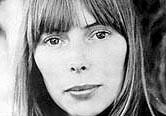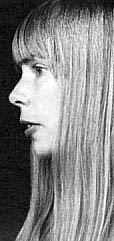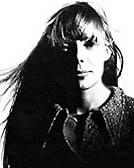HER SWINGIN' '60s CREDENTIALS: She was a graceful clear-voiced guitar-strummin' beatnik folkie who released two albums in the late '60s that included some of her most popular songs ("Both Sides Now," "Chelsea Morning," "Tin Angel").
CATEGORIES OF SWINGIN' CHICK: Songbird and TV Star
BIRTH: She was born in '43, so she hit the '60s at a hopeful seventeen and was still in her mid-twenties as she enjoyed her first success. Her exotic birthplace: Alberta, Canada. Her moniker at birth: Roberta Joan Anderson.
IMPACT ON THE '60s: The late-'60s established her as an intelligent, talented music force, setting the stage and building the momentum for her powerful impact on the '70s in which she poetically, and penetratingly, expressed a sensitive romanticism balanced with fast, hard living. On VH1's list of "The 100 Greatest Women of Rock and Roll," she comes in at #5 behind Carole King, and she may ultimately be regarded as one of the most influential women artists ever before she's through. She was also the inspiration for one of the best-loved songs of the rock era, "Our House" by Graham Nash, which he wrote when they were living together in L.A.
CAREER IN THE '60s: Her albums came out in '68 and '69, ,plus she made lots of club, concert, and TV appearances. Though she missed Woodstock, she wrote the anthem by which it is best remembered, as recorded by Crosby, Stills, Nash and Young. Her main achievements came in the '70s as she moved from folk to jazz, impressively ignoring popular trends and fiercely, bravely blazing her own artistic trails, as usual. Here's a description of her provided by Grace Slick, who met Joni in the late '60s in an L.A. studio and was impressed about how "talented and self-reliant" Joni was; Grace wrote about it in her book Somebody to Love?:
"She somehow managed to put it all together. When David Crosby took me to the studio where she was recording, Joni was sitting quietly in a chair between takes, singing a soft song for anybody who wanted to listen. When she was finished and David introduced us, she seemed so fragile, I thought she'd break into bunches of rose petals on the floor. That first impression was ultimately wrong -- she is a strong woman. But, that first time we met, she seemed like the most sensitive person on the planet."
CAREER OUTSIDE THE '60s: A polio patient as a child, she sang to others in the hospital and got her first taste of performing. She studied art in college and became a well-known folksinger in Calgary and then in Toronto. Relocating to Detroit, some impressive concerts in New York speeded her career in '67 and she began recording. After the '60s, she was featured in a half-dozen concert movies, including The Last Waltz. In the '70s, she created some of the most influential record albums of the decade — Ladies of the Canyon with its hit "Big Yellow Taxi," Blue, For the Roses with its hit "You Turn Me On," and Court and Spark with its hits "Help Me" and "Free Man in Paris." Time magazine even put her on its cover (December 16, 1974) for a feature called "Rock Women." In the latter half of the '70s she lost some of her audience, but gained even more critical respect, with avant-garde improvisational albums like the jazzy, complex Hissing of Summer Lawns, Don Juan's Reckless Daughter, and Mingus. Radio airplay was still hard to come by in the '80s, though you always had the feeling that she didn't really care. Studio albums during these years included Wild Things Run Fast, Dog Eat Dog, and Chalk Mark in a Rain Storm, as she moved from jazz to electronic synth-pop, and her only hit song was a remake of Elvis's "Baby I Don't Care." The '90s saw her change styles yet again, this time back to the simple, guitar-driven sound she'd started with; albums included Night Ride Home and Turbulent Indigo, plus several "greatest hits" collections. In the spring of 2000 she released Both Sides Now, a collection of the century's standards that comment on relationships. Among the classic songs on the album were "Stormy Weather" and a couple of her own songs, with backup provided by the London Symphony Orchestra. Supposedly she liked working with an orchestra so much that she is planning to record an album of her own songs with orchestral backing. In February of 2000 she told the L.A. Times what she thought about current pop music:
"I think it is in a horrible state. I don't even think of it as music anymore, but just the 'ic' business. It's 'icky' because the 'muse' has gone out of it. The divinity that it once contained is gone. Part of it is the capitalistic feeding frenzy. Music today is viewed [by corporations] as simply a [sales line] that is either going up or down. . . . It's just a graph for shareholders. We don't even know who is at the top anymore of all these corporations. There used to be the chairman, who was as high up in a company as you could go, but now the chairman is just a piss-ant in the larger corporation. The other thing I notice is music is being made by committees. I received a lifetime achievement award recently from Sony and they played the year's big songs. They were horrible, one after the other. . . . Drivel, commercial crap. And when people got up to receive the awards, you could see why: There were four to eight people getting up, and sometimes there was a businessman among them. A committee cannot make a work of art. Art is created by one person or two people working in unity."
As if that weren't enough of a rip on the current state of the music biz, Joni said this in Rolling Stone in the Spring of 2000: "The music business just makes me sick. It's just a joke. Can you sit and enjoy any kind of music or awards shows? Where are the adults? Where is the class? This is whiners and screamers and screeches and they're full of themselves over nothing, you know, just like th scum that populates this business. I'm ashamed to be part of it. I hate it with a passion."
TALENT: Perhaps the closest female equivalent to Bob Dylan, Joni has been an amazing songwriter who brought confessional poetry to popular music. Her lyrics continue to amaze and inspire, and her explorations of love and the heart still resonate apart from her melodies. For example, she once said "Sorrow is so easy to express and yet so hard to tell." In '67 she sang "Both Sides Now" over the phone to Judy Collins, who immediately loved it, recorded it, and scored a major hit with it. Joni won a Grammy for her '69 album Clouds. Others have recorded her songs, most famously Crosby, Stills, Nash and Young, who got a hit with her song "Woodstock," written about the famous festival even though she didn't go. What's more, in a display of her versatility, Joni has painted some of her own album covers, including Court and Spark and Crosby, Stills, Nash and Young's greatest hits album. Her voice has changed over the years from the playful sweet soprano she had in the '60s to the deeper vocals she now imparts. Here's the Contra Costa Times' description of the difference, based on her May 2000 concert in the San Francisco Bay Area in which she sang romantic standards identified with Billie Holliday, Frank Sinatra, and others: "The ethereal, loop-de-loop soprano has been replaced by a rich, earthy alto. Mitchell may have changed, but her fans were ready to accept and enjoy the new person she's become." Said the L.A. Times of the same tour, instead of the frequent falsetto edges, "her voice is coated with the raspy feel of experience -- all of which gives her aggressive, jazz-accented interpretations an extra sense of authenticity ... Mitchell and the orchestra, led by arranger-conductor Vince Mendoza, negotiated the songs' emotional twists and turns much like a race car hugs the road on a high-speed curve."
HER '60s LOOK: She had that folksy/hippie/natural thing workin', baby, with her strong, expressive face framed by straight, blonde hair and bangs. Unlike most '70s rock stars, '60s rock stars were fab dressers, if they had the slender figure for it, and Joni did. She stayed with that folksy, comfortable, natural look, and it suited her and her music.
LIFESTYLE: She married older folksinger Chuck Mitchell in '65, but they separated in '66. Rock lore has it that she probably did at least 3/4 of Crosby, Stills, Nash, and Young. She also had a tempestuous relationship with James Taylor that broke off in '71, resulting in inspiration for some of her most acclaimed albums. In the early '80s she married her collaborator, bassist Larry Klein, but they split up in the mid-'90s. In February 2000 she told the L.A. Times what she'd learned over the years about romantic love:
"Romantic love is a trick of nature, fueled by anxiety and insecurity. The moment the thing is secured it dissipates. It's a trick of nature to get us to procreate. There are other kinds of love, however, that are more stable. Romantic love goes out. The Sinatra song ["I Wish I Were in Love Again"] deals with it well. ... 'The quick toboggan when you reach the heights' ... It's all downhill. But you end up saying, 'Oh, I want another hit of it.' It's kind of like drug addiction. ... I have a very good relationship with a man from my hometown. He still lives there. We get together and travel. We are old enough where we are comfortable with a long-distance romance. In our youth, I don't think we could have done it. It's a growing, flowering relationship of nearly seven years. Plus, I have really good friends who I love. I have cats I love. I have a daughter I love. I have grandchildren I love. These are all different kinds of love, but lasting love."
EXTRAS: Of herself she said: "I'm a pretty open person. One of the reasons I have a rep for being reclusive is because I'm either open all the way or I'm shut down" ... of performing she said: "I really enjoyed playing clubs for about forty people. I liked being center of attention, it was like being the life of the part. That I could handle. When it got to the big stage I found that I didn't enjoy it. It frightened me ... I had a lot of bad experiences, including running off many a stage" ... of her songwriting she said: "When I first started writing, I used to write more fictionally, the first three albums were more or less characters ... like any fiction writer there was some basis in something that happened, but after the Blue album I went through a period where I wrote very personal songs" ... of love she said: "Relationship is everything" ... the last four quotes come from Bill Flanagan's book Written in My Soul ... Joni has her own Web site: www.jonimitchell.com.
Click on the linkage in the Table o' Contents on the left to select another Swingin' Chick of the '60s, baby.


